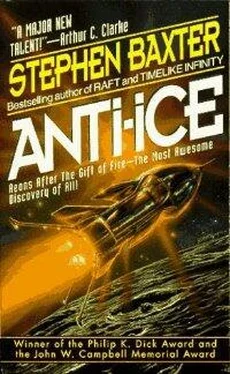9
IN THE SHADOW OF THE MOON
Traveling at several hundred miles each hour, it took the Phaeton twenty days to journey from the Earth to the environs of the Moon.
On the eighteenth day I joined Traveller on his Bridge. The Moon lay dead ahead of the craft, so that it was poised directly above the glass dome of the Bridge. We were already so close to the sister world that it was barely possible to make out the edges of her glowing round face, and the closer we approached the more it seemed that the Moon was flattening into a landscape above us. But it was a strange, inverted landscape. Razor-edged lunar mountains hung above me like stalactites, or unlikely chandeliers which poured ghostly reflected sunlight into our Bridge. My Earth-trained perspective refused to allow me to perceive myself as hanging upside-down above the Moon; it was as if those mountains, those bowls of dust which were the lunar seas, those plains pocked by craters and laced by white rays, were about to tumble down about my defenseless ears.
I looked down at the navigation table, reconfigured now by Traveller to show the Moon. The path of the hapless Phaeton, delineated by little flags, had been heading past the limb of the satellite; now it curved gracefully toward the Moon, so that, if undisturbed, the ship would pass around the lunar perimeter. At first I had imagined that these changes in our path had been due to the firing of our rocket engines, but Traveller explained that the rockets had done little but tweak our path in the required direction; far from the influence of Earth, we were now being pulled across the sky by the gravity of the lunar rocks themselves.
“So, Ned,” Traveller called, and I turned to see him in his throne-chair, bathed in harsh, sharp radiance. “What an adventure awaits us.”
“Sir Josiah, I understand that gravity is pulling us into this orbit toward the Moon. But will gravity pull us all the way down to the surface?”
“No, Ned; if we do not fire the rockets again we will follow a hyperbolic path around the hidden hemisphere of the Moon and be flung away from her.”
“Then let us be flung away, if it is anywhere in the direction of our homeworld! Sir, the Moon is indeed magnificent, but it was surely never designed to sustain human life. Is it truly necessary for us to descend to its surface?”
Traveller sighed and, to my discomfiture, he reached up and removed the platinum nose from his face; with one thumb he rubbed the rim of the dark cavity so revealed, and then replaced the nose into his skull. “Ned, every time I discern some glimmering of intelligence in that bullet-shaped cranium of yours I am disappointed by a crass remark. I have explained this to you at least twice.”
“Then I apologize, sir, for the point is still unclear to me.”
“Is specific impulse such a difficult concept? Dear God… Very well, Ned. To enable the Phaeton to come so far our Monsieur Bourne has severely depleted our supply of reaction mass—of water. Even if we could somehow bend our trajectory to return to Earth, we should surely burn like toast as we hurtled uncontrolled through the atmosphere, with our remnants smashing into oblivion in the ground. So we need more water.”
“A cheerful prospect. But if it is so impossible to land on Earth, how can we hope to land safely on the Moon?”
Traveller’s face was turned up to the Moon, and I imagined him struggling for patience. “Because the pull of gravity is only one-sixth that at Earth’s surface. And so our enfeebled rockets can bring us safely out of orbit and to a soft landing on the lunar plains long before we run out of water.”
I turned my face up to the Moon; I let its pale light fill my eyes, and I voiced my darkest fear. “Sir Josiah, let us face the truth. The Moon is a desolate, airless planet; we are no more likely to find water down there, frozen or otherwise, than we are to find a Cockney urchin selling hot chestnuts.”
Traveller snorted laughter, his nose giving the sound a disconcerting metallic ring. “Forgive me, Professor Lord Ned; I did not realize you were such an expert on lunar and planetary theories.”
“I am not, sir,” I said with some dignity, “but nor am I a fool; and I am capable of following the newspapers.”
“Very well. There are three counters to your objections to my plan. First, that we have no alternative! There is nowhere else accessible to us which offers even the prospect of water, or any other suitable liquid. So it is the Moon or nothing, Ned.
“Second, the opinion of the savants on the composition of the lunar surface is not as united as you appear to believe.”
“But surely the accepted wisdom is that the Moon is barren, inert, lifeless, and without atmosphere.”
“Pah!” Traveller snorted. “And what observations are such theories based on? For every sighting of a sharp occultation of a star by the limb of the Moon—’demonstrating’ by the absence of dimming or refraction, you see, that there is no air—I can quote another in direct contradiction. Only twenty years ago the Frenchman Laussedat noted a refraction of the solar disc during an eclipse.” Traveller, lying prone in his couch, held out his arms as if to embrace the lunar goddess above him. “I accept that our own eyes show us now that the Moon cannot have a blanket of atmosphere as thick as that of Earth; for surely if she did, her mountains and valleys would be hidden by a swirling layer of clouds and haze. And the lighter gravity, so advantageous to us in other ways, does not lend itself to the retention of a heavy atmosphere. But it is surely not beyond the bounds of possibility that we may find pockets of air in the deeper valleys, or even that a rarefied air might linger over the entire surface?
“And besides, recall that we have only observed one side of the Moon. The satellite dances about the Earth, keeping one face modestly turned away. Even from this vantage point we have not yet seen the hidden face, Ned! Who knows what we may find?”
“Craters, and mountains, and seas of dust.”
“Mr. Wickers, your mind is like a shriveled prune, dry and incapable of surprise. What if the theories of Hansen are verified? Eh?” Hansen, it emerged, was a Danish astronomer who had suggested that the Moon had been pulled, by Earth’s gravity, into an egg-shape, and circled the Earth with the fatter end averted; and that a layer of thick atmosphere had accumulated over this heavier hemisphere, conveniently hidden from the view of inquisitive astronomers.
“Well, Sir Josiah,” I said, “we must wait and see.”
He snorted again. “Spoken like a feeble scientist, lad. You must learn to think like an engineer! To a scientist nothing is proven until it is demonstrated, every way up, before the eyes of a dozen of his sober-suited peers. But an engineer seeks what is possible. I don’t care if this theory is right or wrong; I ask instead what I can do with it.”
“Sir Josiah, you listed three counters to my objection. What is the third?”
Now he twisted in his chair and craned his neck; his deformed face, half-silhouetted by the moonlight, was alive with excitement. “Ah, Ned, the third counter is simply this: whether we live or die, what fun it will be to walk among the mountains of the Moon!”
I peered up at the forbidding world rotating slowly above me and wished I could find it in my young heart to share Traveller’s enthusiasm for the exotic and the spectacular; but, at that moment, I would have given all my astonishing experiences to be safely back in the snug bar of a Manchester club.
* * *
After the excitement of the reclaiming of the Bridge we had returned to our settled routine—with the exception that poor Bourne sat in his chair in the Cabin now, a silent, resentful specter—and the remaining hours of our voyage wore away rapidly.
Читать дальше












